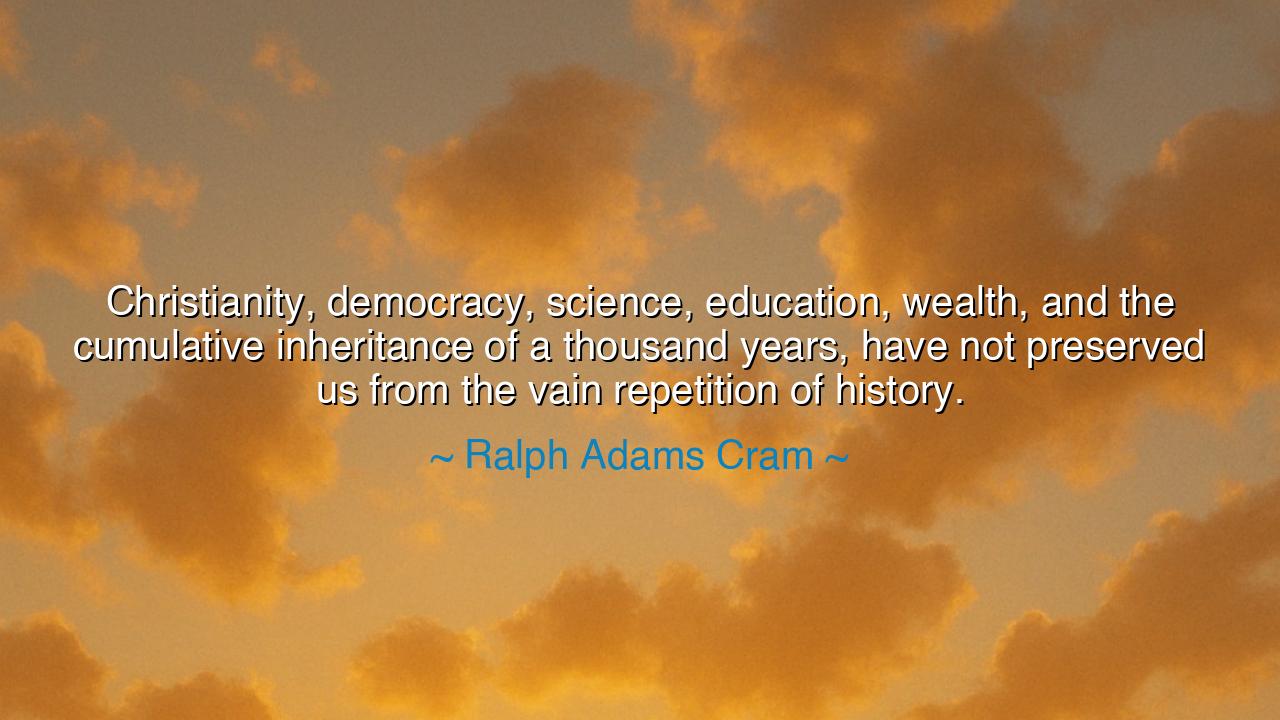
Christianity, democracy, science, education, wealth, and the
Christianity, democracy, science, education, wealth, and the cumulative inheritance of a thousand years, have not preserved us from the vain repetition of history.






The words of Ralph Adams Cram fall upon the heart like a solemn bell tolling through the corridors of time: “Christianity, democracy, science, education, wealth, and the cumulative inheritance of a thousand years, have not preserved us from the vain repetition of history.” In this haunting reflection, Cram laments the tragic blindness of humankind—the irony that, despite possessing the greatest tools of enlightenment and progress, man continues to stumble down the same dark roads of pride, war, and folly. His statement is both an elegy and a warning: that civilization’s progress is no guarantee of human wisdom, and that the cycles of ruin repeat not because we lack knowledge, but because we lack understanding.
To understand the heart of this quote, we must look first to Ralph Adams Cram himself—a man of paradox and vision. Born in the late 19th century, Cram was both an architect and a philosopher, a craftsman of stone and of ideas. He lived through the horrors of the First World War, an age that saw the height of modern science turned toward destruction. He witnessed how nations that prided themselves on culture, faith, and intellect could unleash barbarity upon the earth with the cold precision of machines. It was this betrayal of progress that gave rise to his lament: that the triumphs of civilization—Christianity, democracy, science, education, wealth—had not lifted humanity out of its primal errors. Instead, they had merely built higher towers from which mankind could fall.
Throughout history, this repetition of folly has been the rhythm of empires. The Greeks, masters of reason, fell to internal division and hubris. The Romans, architects of law and governance, decayed in luxury and moral decline. The scholars of the Renaissance revived wisdom but soon plunged Europe into the flames of religious war. And in Cram’s own time, the industrialized nations, armed with enlightenment and invention, turned those very gifts into instruments of slaughter. Thus, he saw that progress without virtue is like a chariot without a driver—it moves swiftly, but toward the abyss. Humanity, he warned, has learned how to build, but not why to build.
There is in his words the echo of an ancient truth: that knowledge without morality is powerless to save. Science can teach us to fly, but not how to soar without hatred. Democracy can give us freedom, but not the wisdom to use it well. Wealth can create comfort, but not compassion. Education can fill the mind, yet leave the soul barren. Cram’s lament reveals that it is not ignorance that destroys civilizations—it is arrogance. We believe that because we possess the fruits of progress, we are immune to the decay that felled our ancestors. Yet history shows that when moral foundations crumble, even the grandest achievements turn to dust.
Consider the example of Germany in the 20th century, a land of philosophers, poets, scientists, and theologians—one of the most educated societies the world had ever known. Yet out of that soil rose the madness of tyranny and genocide. Knowledge did not protect them; religion did not restrain them; wealth did not redeem them. The old sins of conquest and cruelty returned in new forms, clothed in the language of ideology and efficiency. Here, the truth of Cram’s words became flesh: the “vain repetition of history” was not a failure of intellect, but of spirit. Humanity’s tools had advanced, but its heart had not.
And so, his quote is not merely a criticism, but a call to remembrance. Cram beckons us to awaken to the reality that progress must be accompanied by humility, and that the moral imagination must grow alongside material achievement. We must not mistake the accumulation of comfort for the advancement of character. A thousand years of inheritance—faith, law, learning, art—mean nothing if each generation forgets to renew them through reverence and reflection. The torch of civilization, passed from age to age, must be carried not by those who boast of its light, but by those who fear to let it go out.
The lesson, then, is clear and timeless: if we are to break the cycle of repetition, we must look inward as much as outward. Let faith teach us compassion, not dogma. Let science serve life, not dominion. Let education awaken virtue, not vanity. Let wealth be a means to justice, not indulgence. And let democracy remind us that freedom is not the right to do whatever we wish, but the duty to do what is right. For only when the heart of man evolves alongside his inventions will history cease to mirror its own mistakes.
Thus, in the voice of Ralph Adams Cram, we hear not despair, but a solemn hope—that humanity might one day learn from its scars, and remember that progress without morality is but motion without meaning. His warning endures as a light in the ruins of time: that the true measure of civilization lies not in what it builds, but in what it becomes. And unless we root our future in wisdom and humility, we shall find, as every fallen empire has before us, that even the mightiest inheritance cannot save those who forget the lessons of their past.






AAdministratorAdministrator
Welcome, honored guests. Please leave a comment, we will respond soon